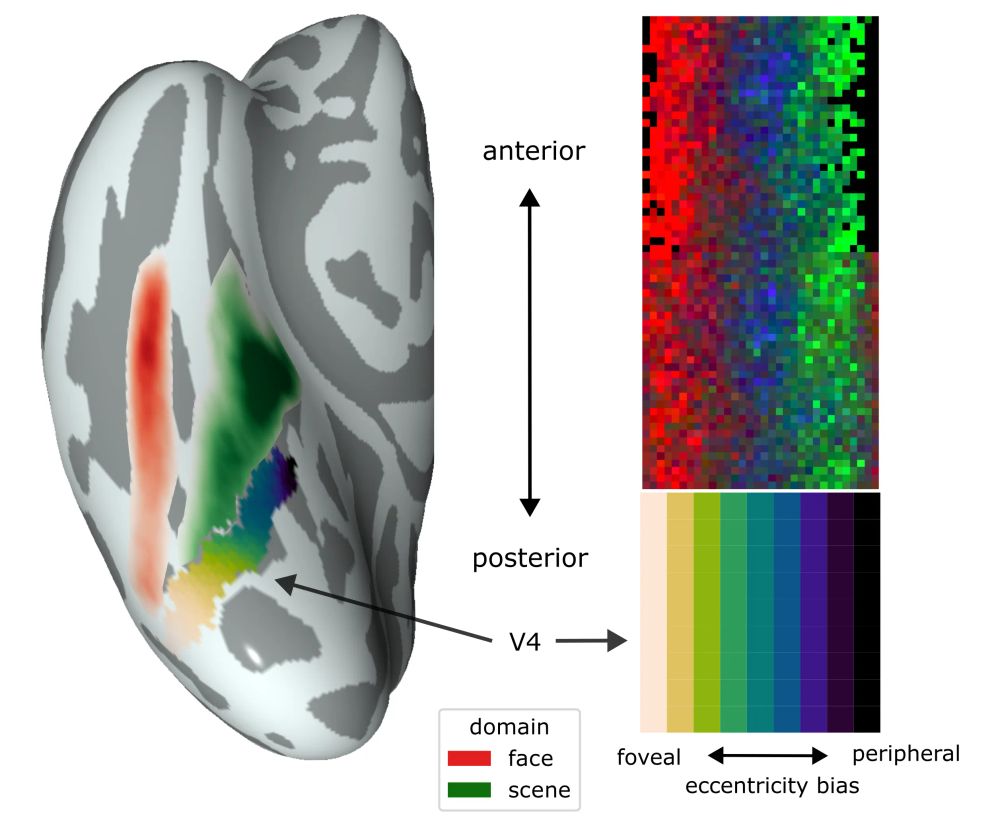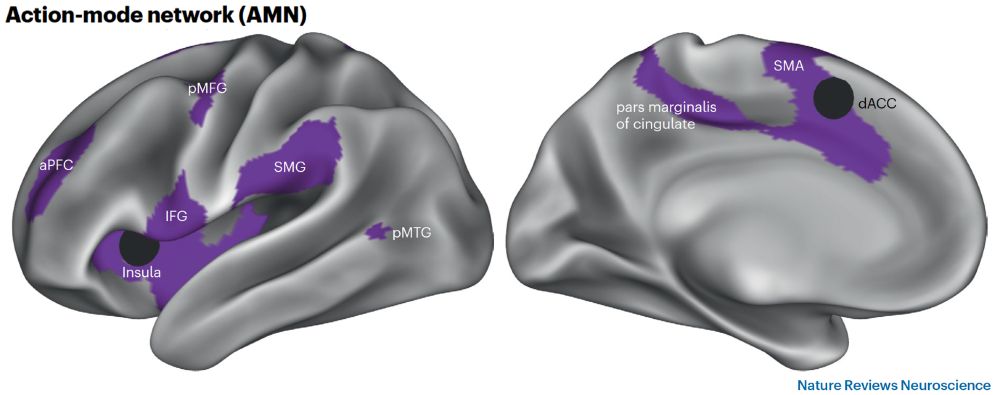
What shapes the topography of high-level visual cortex?
Excited to share a new pre-print addressing this question with connectivity-constrained interactive topographic networks, titled "Retinotopic scaffolding of high-level vision", w/ Marlene Behrmann & David Plaut.
🧵 ↓ 1/n
16.06.2025 15:11 — 👍 67 🔁 24 💬 1 📌 0

However, when we trained on less broad distributions of viewing size, the topographic responses became less invariant to retinotopic variation. At small sizes, scenes responded more like objects, and at large sizes, objects responded more like scenes.
9/n
16.06.2025 15:12 — 👍 1 🔁 1 💬 1 📌 0

A schematic of the process of extrusion where a block of material is passed through a sheet with a hole of a certain shape which cuts the block. The block is labeled “cognitive science”, the sheet “some arbitrary cogsci methodology”, and the shaped block on the other side “a fundamentally novel research field, the likes of which we’ve never seen before”.
Ok here’s a very general template people can build on. Some will use this as a meme template. Others will use it as a template to build careers out of extruding fields from cognitive science. There’s something for everyone!
16.02.2025 13:35 — 👍 25 🔁 12 💬 0 📌 1

The brain’s action-mode is created by a dedicated action-mode network (AMN) rdcu.be/d5odm. In the brain’s mode continuum, AMN sits opposite DMN’s default-mode, as yin-yang. AMN might be key in pain, apathy, Parkinson’s. New @natrevneurosci.bsky.social w/ Marc Raichle & @gordonneuro.bsky.social 🧵 ⬇️
02.01.2025 16:48 — 👍 144 🔁 64 💬 4 📌 4
"The reproducibility buddy", what an interesting concept!
30.11.2024 09:27 — 👍 22 🔁 3 💬 0 📌 0
Non-visual spatial and sensorimotor strategies are as effective as visuospatial ones in visual working memory tasks. This challenges the “visual” vs. “verbal” dichotomy and highlights the role of non-visual representations in working memory.
28.11.2024 09:36 — 👍 0 🔁 0 💬 0 📌 0
The project by Gökberk et al. is now out 🥁🧬📖🧠
We found partly shared genetic contributions to individual differences in language and musicality-related traits. In line with other human traits, Neanderthal alleles displayed reduced contribution to overall genetic associations.
More in the link.
22.11.2024 10:54 — 👍 4 🔁 2 💬 0 📌 0
Incoming Asst. Prof of Psych & Brain @ WashU starting 1/26 | postdoc @ MIT & PhD @ UofToronto | Attention, Learning, Episodic Memory, Developing Brain
Professor @SapienzaRoma - Comparative psychology, music neuroscience & bioacoustics. Works on rhythm/sync/speech/communication across species (humans, primates, marine mammals, etc.)
Scientist, Professor
Passionate advocate for responsible and humane research involving animals.
#ThankAMonkey #EndSufferingThruScience
Views are my own.
postdoc @ harvard | neural networks | cortical topography | learning | vision | language | neurotech
https://nblauch.github.io
PI of the https://imaginerealitylab.org/ @uclbrainscience.bsky.social where we investigate the neural and computational mechanisms of mental imagery and reality monitoring. Activist about mental health and EDI in academia. She/her.
PhD | Now freezing in fantastic Leipzig (@mpicbs.bsky.social, @FriedericiLab). Interested in language and primate brain evolution | neuroanatomy | art | music
yannickbecker.weebly.com
Neuroscientist and connectome researcher. Human & chimpanzee brain connectivity / microstructure using diffusion MRI. Learning & brain plasticity @ MPI CBS, Leipzig
Father, husband, scientist
European Research Council, set up by the EU, funds top researchers of any nationality, helping them pursue great ideas at the frontiers of knowledge. #HorizonEU
Research director | @McGillU @Mila_Quebec @IVADO_Qc | My team designs machine learning frameworks to understand biological systems from new angles of attack
Asst Professor Psychology & Data Science @ NYU | Working on brains & climate, separately | Author of Models of the Mind: How physics, engineering, and mathematics have shaped our understanding of the brain https://shorturl.at/g23c5 | Personal account (duh)
A forum in Biology, Ecology and Cognitive Science
BRNet is an international network of researchers who investigate the psychology and neuroscience of body representation #BRNet.
https://bodyrepresentation.wixsite.com/brnet/
Cognitive scientist at CRPN (Marseille, France). My research focuses on multisensory integration, body perception, and perceptual metacognition. She/her
Neuropsychologist, psychotherapist and Professor of Psychodynamic Neuroscience at UCL. Likes all things at the interface between mind and body. Believes the social brain is the answer to most mind and body questions. www.katfotlab.com
We investigate the interplay of bodily rhythms, brain activity, and behaviour in health and disease. Located at the University of Münster. PI: Daniel Kluger.
Neuroscientist, psychologist, and author of "Seven and a Half Lessons About the Brain" (an Amazon "Best Book") and "How Emotions are Made." LisaFeldmanBarrett.com
M.D Ph.D ⚬ Clinical Narrative & Scientific Research ⚬ Neuropsychiatry ⚬ National Institute of Neurology and Neurosurgery of Mexico / SNI2 ⚬ English/Spanish
Philosopher / Cognitive Scientist working on self consciousness and social interactions in humans and artificial agents/ Embodiment/ AI / Art & Science
In Lisbon & London
Prof of Cognitive Neuroscience & Vice Dean at UCL, Fellow of the Royal Inst. of Navigation. I study how we remember, navigate & imagine space
Photo: Our upcoming field research in the Marshall Islands
https://spierslab.wixsite.com/wavesandwayfinding




